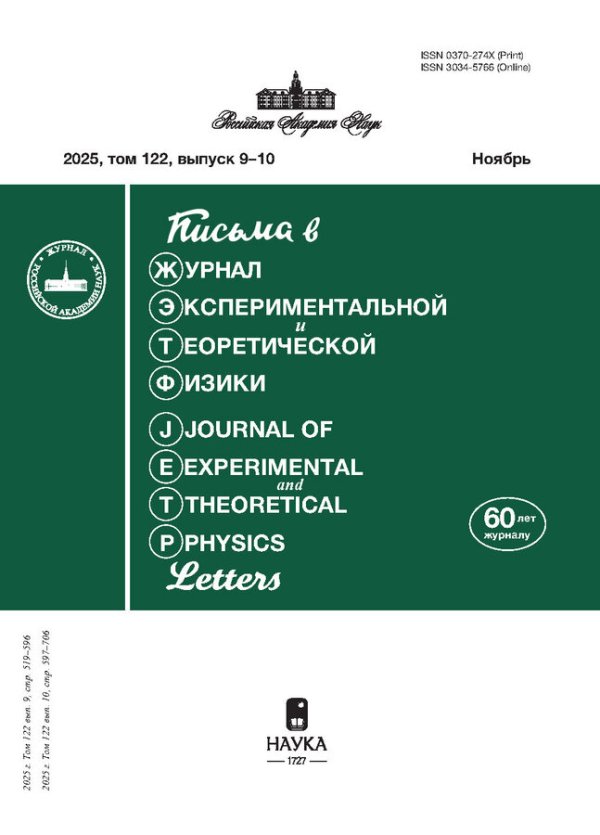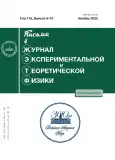Temperature Dependence of the Band Gap of Completely Fluorinated/Hydrogenated Carbon Nanotubes: The Role of One-Dimensional Chains
- Authors: Katkov V.L.1, Osipov V.A.1
-
Affiliations:
- Joint Institute for Nuclear Research
- Issue: Vol 118, No 9-10 (11) (2023)
- Pages: 748-753
- Section: Articles
- URL: https://vestnik.nvsu.ru/0370-274X/article/view/664238
- DOI: https://doi.org/10.31857/S1234567823220081
- EDN: https://elibrary.ru/PIXLDD
- ID: 664238
Cite item
Abstract
The temperature dependence of the band gap Eg(T) in zigzag single-walled carbon nanotubes at the maximum (50%) fluorination and hydrogenation has been theoretically investigated for three coating versions. It has been shown that the character of coating dramatically affects the dependence Eg(T), which may vary over a wide range from very weak (typical of pure carbon nanotubes) to strong (typical of bulk semiconductors). The character of the temperature behavior Eg(T) is directly related to the formation of one-dimensional alternating chains in nanotubes. The main factors determining this dependence are the diameter of carbon nanotube, impurity position, and impurity type.
About the authors
V. L. Katkov
Joint Institute for Nuclear Research
Email: katkov@theor.jinr.ru
141980, Dubna, Moscow region, Russia
V. A. Osipov
Joint Institute for Nuclear Research
Author for correspondence.
Email: osipov@theor.jinr.ru
141980, Dubna, Moscow region, Russia
References
- L. Qian, Y. Xie, S. Zhang, and J. Zhang, Matter 3, 664 (2020).
- R. D. Yamaletdinov, V. L. Katkov, Y. A. Nikiforov, A. V. Okotrub, and V. A. Osipov, Advanced Theory and Simulations 3(4), 1900199 (2020).
- L. A. Chernozatonskii, P. B. Sorokin, and A. A. Artukh, Russ. Chem. Rev. 83, 251 (2014).
- J. E. Johns and M. C. Hersam, Acc. Chem. Res. 46(1), 77 (2013); PMID: 23030800.
- R. B. Capaz, C. D. Spataru, P. Tangney, M. L. Cohen, and S. G. Louie, Phys. Rev. Lett. 94, 036801 (2005).
- E. T. Mickelson, I. W. Chiang, J. L. Zimmerman, P. J. Boul, J. Lozano, J. Liu, R. E. Smalley, R. H. Hauge, and J. L. Margrave, J. Phys. Chem. B 103(21), 4318 (1999).
- G. Seifert, T. K¨ohler, and T. Frauenheim, Appl. Phys. Lett. 77, 1313 (2000).
- K. N. Kudin, H. F. Bettinger, and G. E. Scuseria, Phys. Rev. B 63, 045413 (2001).
- C. W. Bauschlicher, Nano Lett. 1(5), 223 (2001).
- M. de Avila Ribas, A. K. Singh, P. B. Sorokin, and B. I. Yakobson, Nano Res. 4, 143 (2010).
- S. Ponc'e, G. Antonius, Y. Gillet, P. Boulanger, J. La amme Janssen, A. Marini, M. Cˆot'e, and X. Gonze, Phys. Rev. B 90, 214304 (2014).
- J.-M. Lihm and C.-H. Park, Phys. Rev. B 101, 121102 (2020).
- M. Zacharias and F. Giustino, Phys. Rev. B 94, 075125 (2016).
- M. Zacharias and F. Giustino, Phys. Rev. Res. 2, 013357 (2020).
- M. Zacharias and P. C. Kelires, J. Phys. Chem. Lett. 12, 9940 (2021).
- F. Karsai, M. Engel, E. Flage-Larsen, and G. Kresse, New J. Phys. 20, 123008 (2018).
- Y. Zhang, Z. Wang, J. Xi, and J. Yang, J. Phys. Condens. Matter 32, 475503 (2020).
- H. Shang and J. Yang, J. Chem. Phys. 158, 130901 (2023).
- B. Monserrat, Phys. Rev. B 93, 014302 (2016).
- B. Hourahine, B. Aradi, V. Blum et al. (Collaboration), J. Chem. Phys. 152, 124101 (2020).
- S. Grimme, C. Bannwarth, and P. Shushkov, J. Chem. Theory Comput. 13, 1989 (2017).
- O. Dubay and G. Kresse, Phys. Rev. B 67, 035401 (2003).
- A. Croy, E. Unsal, R. Biele, and A. Pecchia, J.Comput. Electron. 22, 1231 (2023).
Supplementary files








